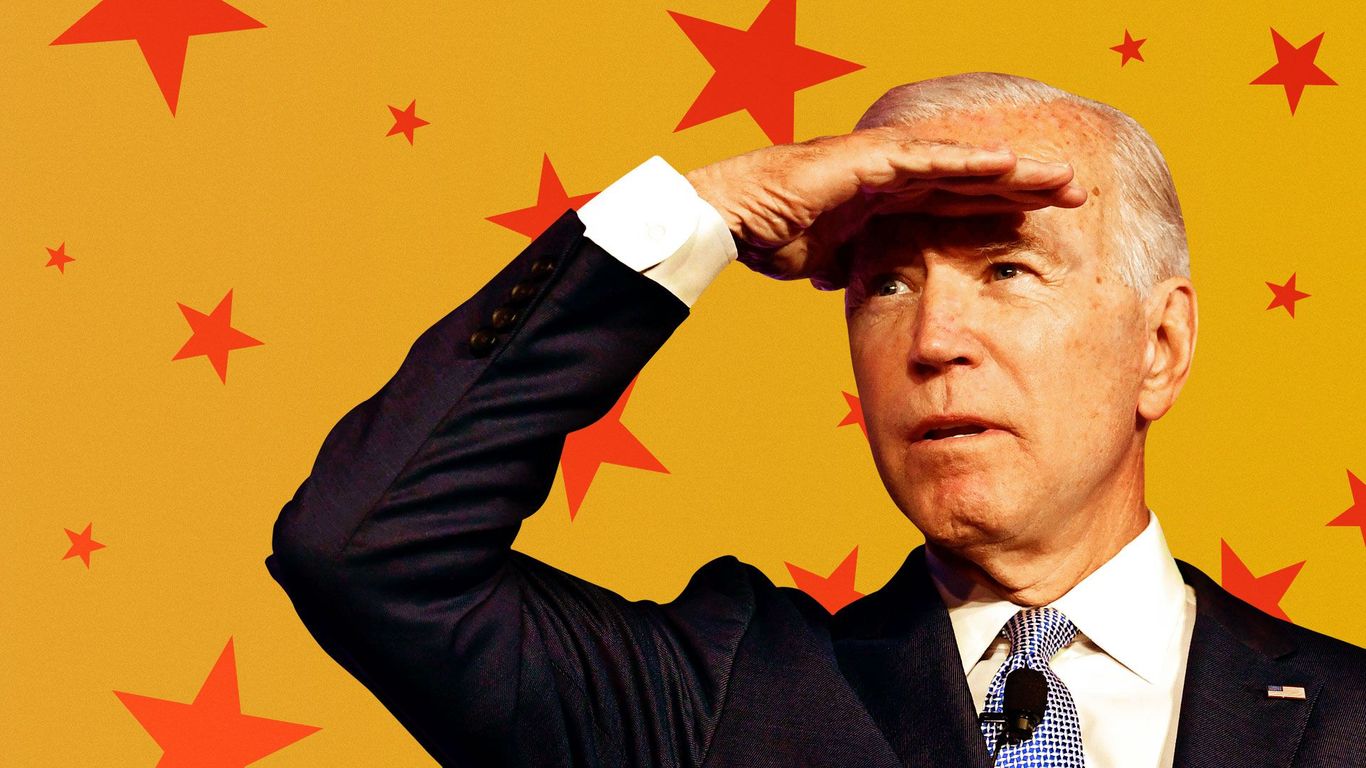The new administration’s first few moves and statements on China suggest that President Biden may continue some of the Trump era’s most assertive policies.
Why it matters: China’s severe domestic repression, its dramatic rise as a technological superpower, and its increasingly aggressive actions around the globe mean that the world expects the American president to take action.
What they’re saying: “Strategic competition with China is a defining feature of the 21st century. China is engaged in conduct that hurts American workers, blunts our technological edge, and threatens our alliances and our influence in international organizations,” White House spokeswoman Jen Psaki said on Monday.
- “What we’ve seen over the last few years is that China is growing more authoritarian at home and more assertive abroad. And Beijing is now challenging our security, prosperity, and values in significant ways that require a new U.S. approach.”
Between the lines: The White House rhetoric on China so far is remarkably similar to the Trump administration’s.
- In addition to the emphasis on “strategic competition,” Psaki also mentioned “China’s economic abuses,” its influence over international organizations, its forced technology transfers, and “holding China accountable” — all issues Trump administration officials repeatedly highlighted in their public remarks.
- Yes, but: One major difference from Trump-era rhetoric is Biden’s strong emphasis on multilateralism. In her remarks on Monday, Psaki answered almost every China question with a reference to America’s “allies and partners.”
Here’s a closer look at some of the actions and statements from the Biden administration so far:
Taiwan: Bi-khim Hsiao, the de facto Taiwanese ambassador to the U.S., attended Biden’s inauguration after receiving a formal invitation — the first time since 1979 that the Taiwanese representative has attended a presidential inauguration.
- The unprecedented move suggests the Biden administration may uphold the Trump administration’s Jan. 9 lifting of all self-imposed bureaucratic restrictions on the U.S.-Taiwan relationship.
- Hsiao’s attendance “reflects the consideration of the new administration to treat Taiwan’s de facto diplomatic mission here in the United States with more dignity and respect than previously afforded to them by excessively proscriptive protocols,” said Russell Hsiao, executive director of the DC-based Global Taiwan Institute, told Axios.
- On Jan. 23, the State Department also issued a statement affirming “rock-solid” support for Taiwan and expressing “concern” after China sent several bombers and jet planes into Taiwan’s airspace late last week.
Defense: New Defense Secretary Lloyd Austin has come out swinging on China.
- “China presents the most significant threat going forward because China is ascending,” Austin said during his Senate confirmation hearing last week.
- He also said the 2018 National Defense Strategy, which the Trump administration published and which presents China and Russia as serious threats, is for the most part “absolutely on track for today’s challenges.”
Tech: Austin said the U.S. needs a stronger response to China’s growing ascendance in AI and other emerging technologies, and Psaki said that “technology is at the center of the U.S.-China competition.”
- What to watch: Without offering specifics, Psaki suggested Biden might keep Huawei and several other Chinese companies on the export blacklist, or adopt similar measures: “We need to play a better defense, which must include holding China accountable and making sure that American technologies aren’t facilitating China’s military build-up.”
Multilateral institutions: Biden halted the U.S. withdrawal from the World Health Organization, scheduled to occur on July 6. Trump had announced the withdrawal last year after citing Beijing’s influence over the organization during the pandemic.
Trade: The Biden administration may be moving away from negotiating access to Chinese markets for big American financial and pharmaceutical companies, and instead focusing on trade policies that help workers more directly, the Wall Street Journal reports.
- “The point of further trade negotiation isn’t to make the world safe for multinational corporation investment,” Biden’s national security advisor Jake Sullivan said. “It’s about jobs and wages.”
- On Monday, Biden also signed an executive order to strengthen the federal government’s Buy American guidelines, which are aimed at supporting domestic manufacturing. Trump had issued a similar order, but loopholes persisted. Chinese manufacturers are often direct competitors to U.S. companies.
- What to watch: It’s still unclear how Biden will deal with the billions of dollars in tariffs that remain after the Phase One trade deal was signed, though Psaki said Biden “will take a multilateral approach to engaging with China and that includes evaluating the tariffs currently in place.”
The bottom line: When it comes to China, Biden seems unlikely to adopt the open-armed engagement policies of the Obama years. But it’s still too early to tell exactly how tough he’ll be.
